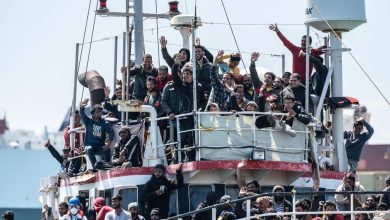Gibraltar refuses United States request to seize Iranian tanker

Gibraltar has refused a request by the United States to seize an Iranian oil tanker at the centre of a diplomatic standoff between Tehran and Europe.
British Royal Marines had seized the vessel in Gibraltar in July on suspicion that it was carrying oil to Syria, a close ally of Iran, in violation of European Union sanctions.
That detention ended last week, but on Friday a US court issued a warrant for the seizure of the tanker, on the grounds that it had links to Iran’s Islamic Revolutionary Guard Corps (IRGC), which Washington has designated a “terrorist” organisation.
Gibraltar’s government said on Sunday it could not comply with the US request because of European law.
“The Central Authority’s inability to seek the Orders requested is a result of the operation of European Union law and the differences in the sanctions regimes applicable to Iran in the EU and the US,” the government said in a statement.
“The EU sanctions regime against Iran – which is applicable in Gibraltar – is much narrower than that applicable in the US.”
Iran has denied the tanker was ever headed to Syria.
Al Jazeera’s Andrew Simmons, reporting from Gibraltar, said the authorities in the overseas British territory had determined that the US court order did not apply in Gibraltar.
“The US action is based on US sanctions, the action taken by Gibraltar and the UK was enforced under EU sanctions, and as far as that issue goes there is compliance now. There was an assurance [from Iran] that this cargo on board, 2.1 million barrels of light crude oil, is not destined for Syria,” he said.
Tehran said on Sunday it was ready to dispatch its naval fleet to escort the tanker – now renamed the ‘Adrian Darya-1’ – if required.
“The era of hit and run is over … if top authorities ask the navy, we are ready to escort out tanker Adrian,” Iran’s navy commander, Rear Admiral Hossein Khanzadi was quoted as saying by Mehr news agency.
On Sunday, video footage and photographs showed the tanker flying the red, green and white flag of Iran and bearing its new name, painted in white, on the hull.
Its previous name, ‘Grace 1’, had been painted over. The vessel’s anchor was still down.
Hamid Baeidinejad, Iran’s ambassador to Britain, said the vessel was expected to leave Gibraltar on Sunday night.
Gibraltar’s Supreme Court on Thursday ordered the release of the vessel after 43 days in detention.
The decision came after Gibraltar’s government said it had received written assurances from Iran that the ship would not be headed for countries “subject to European Union sanctions”.
The seizure triggered a sharp deterioration in relations between Iran and the United Kingdom. Tehran subsequently detained the British-flagged tanker in what was seen as a tit-for-tat move.
That tanker, the Stena Impero, is still detained.
“The hope is there is a reciprocal action from Iran at some point, easing tensions in the Strait of Hormuz,” said Al Jazeera’s Simmons. “But that depends on what the US does next in terms of seizing this renamed and reflagged ship.”
The two vessels have since become pawns in a bigger game, feeding into wider hostilities since the US last year pulled out of an international agreement to curb Iran’s nuclear programme, and reimposed economic sanctions.




